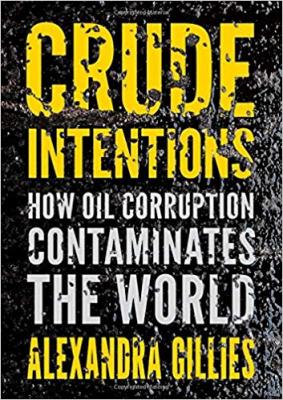Crude Intentions: How Oil Corruption Contaminates the World
A Lecture by Alexandra Gillies, Advisor to the Natural Resource Governance Institute
Matrix is located on the 8th floor of Barrows Hall, on the UC Berkeley campus, near Telegraph and Bancroft Avenues, just up the hill from Sather Gate. There are entrances at both ends of the building, but only one of the elevators on the eastern side goes directly to the 8th floor. You can alternatively take the stairs to the 7th floor and walk up the stairs.

Please join us on March 4, 2020 at 12pm for a lecture by Alexandra Gillies, an expert on oil-sector corruption and author of the book Crude Intentions: How Oil Sector Corruption Contaminates the World. This event is co-sponsored by the Center for Africa Studies and Berkeley Law’s Center for Law, Energy & the Environment
RSVP HERE
About the Book
“Gillies has written an essential primer on the new world order, in which kleptocrats are hijacking the global economy. From Goldman Sachs to Goodluck Jonathan, Rosneft to the Republican Party, she shows us how the corruption pandemic has spread worldwide. Her book pulses with a spirit not of despair but of action: don't let them get away with it.” —Tom Burgis, author of The Looting Machine
“In this gripping, deeply-informed book, Gillies reveals the intricate deceptions, unwitting enablers, and extravagant fraud that has turned oil into staggering wealth, power, and corruption.” —Michael Ross, Professor of Political Science, UCLA
Billions of dollars stolen from citizens are circling the globe, enriching powerful individuals, altering political outcomes, and disadvantaging everyday people. News headlines provide glimpses of how this corruption works and why it matters: President Trump's businesses struck deals with oligarchs and sold property to secretive shell companies; the Panama Papers leak triggered investigations in 79 countries; and corruption scandals toppled heads of state in Brazil, South Africa, and South Korea. But how do these pieces fit together? And if the corruption is so vast and so tied up with powerful interests, how do we begin to fight back?
To find answers, Crude Intentions examines the corruption crisis that erupted during the recent oil boom. From 2008 to 2014, oil prices shot through the roof. Motivated by more than nine trillion dollars in new oil money, corruption followed apace. Examining the oil boom is like placing a drop of dye in the circulatory system of global corruption, and watching as it reveals the system's channels and pathways. Company bosses signed off on risky schemes to snap up choice oil blocks. Politicians in Brazil and Nigeria stole billions to build up their election war chests. Kleptocrats in Angola, Azerbaijan, and Russia seized upon the oil wealth to cement their hold on power. And an army of bankers, accountants, and lawyers lined up to help these corrupt actors stash their loot in the global system of shell companies and tax havens that serve today's super-rich. The money then bought yachts, mansions, and even a few foreign politicians.
Drawing on information exposed by intrepid journalists, prosecutors, and whistle blowers, Crude Intentions tells jaw-dropping stories of corruption and asks what we can learn from them. The cases reveal common tactics, but also vulnerabilities in this web of fraud. These are the starting points for building a smarter fight against corruption, in the oil sector and well beyond.
About the Author
Alexandra Gillies is an expert on oil-sector corruption and the author of Crude Intentions: How Oil Sector Corruption Contaminates the World. Other recent work has focused on the Nigerian oil sector, national oil companies, commodity trading, and promoting transparency standards including the Extractive Industries Transparency Initiative (EITI). She has authored academic articles on related topics and co-edited the volume Smart Aid for African Development (Lynne Reiner, 2009). She is an advisor to the Natural Resource Governance Institute.
Alexandra holds a Ph.D. in international relations from the University of Cambridge, where she researched the political economy of the Nigerian oil sector. She spent 2008 in Nigeria as a Fulbright Fellow. Prior to joining NRGI, she consulted for the World Bank, DFID, USAID and several political risk firms. She served as assistant director of the Program of African Studies at Northwestern University. Alexandra also holds degrees from the University of Ghana and Emory University.



